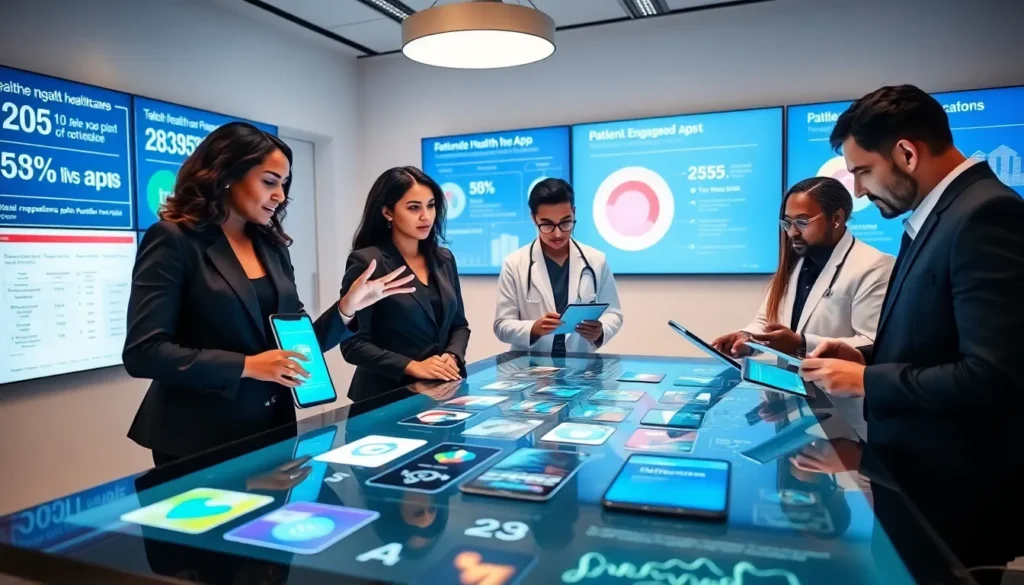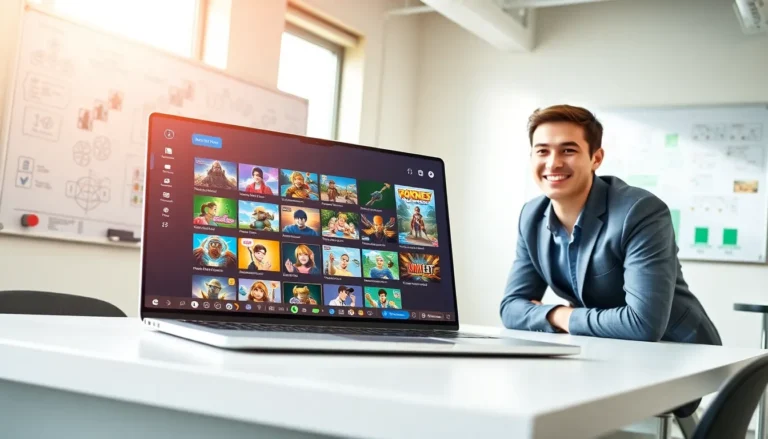Table of Contents
ToggleIn the bustling world of healthcare, there’s a revolution happening right in the palm of our hands. Mobile apps for healthcare are not just a trend, they’re a game-changer. Imagine managing your doctor’s appointments, tracking your fitness, or even consulting a medical professional right from your phone. Sounds appealing, right? This article dives into the intriguing realm of mobile health applications, showcasing their rise, benefits, and what the future holds, while keeping it informative and a bit witty. So, fasten your seatbelt: we’re about to explore how these little icons can have a big impact on our well-being.
The Rise Of Mobile Health Applications

Mobile health applications, often dubbed mHealth apps, have witnessed exponential growth over the last decade. With smartphones becoming ubiquitous, it’s no surprise that healthcare is getting a digital overhaul. These apps cater to various health needs, from fitness tracking to chronic disease management.
The COVID-19 pandemic further accelerated this trend. Overnight, telehealth became a common term, and people embraced virtual consultations as a safe alternative. As a result, what was once a niche market has exploded into a multi-billion-dollar industry, with projections indicating continued growth. Statistically speaking, the global mHealth app market is expected to reach over $150 billion by the year 2028. That’s a significant leap, reflecting society’s willingness to embrace digital health solutions.
Benefits Of Mobile Health Apps
Mobile health apps come with a buffet of benefits that can enhance user experience and improve health outcomes.
- Accessibility: With health information just a tap away, individuals can access their medical records, schedule appointments, or find healthcare providers without breaking a sweat.
- Cost Efficiency: By facilitating telemedicine and reducing unnecessary emergency visits, patients can save both time and money. It’s like having a personal health assistant in your pocket.
- Personalization: These apps can tailor recommendations based on individual health data, making healthcare less one-size-fits-all and much more user-friendly.
- Engagement: Users are more likely to engage in their health management when they can see their progress tracked in real time, and apps are great for that. Bulls-eye for motivation.
- Preventive Care: Many apps emphasize preventive health measures, reminding users to take medication or schedule necessary check-ups. Preventing illness is always better than curing it.
Types Of Mobile Healthcare Apps
To meet diverse user needs, mobile healthcare apps can be categorized into several types:
- Fitness and Wellness Apps: These help users track physical activity, diet, and wellness goals. Think of apps like MyFitnessPal or Fitbit that motivate users toward healthier lifestyles.
- Chronic Disease Management Apps: For individuals managing chronic conditions, these apps assist in monitoring symptoms, medications, and overall health metrics. Examples include diabetes management apps that track blood sugar levels.
- Telemedicine Apps: Allowing patients to consult healthcare providers virtually, telemedicine apps have surged during the pandemic. Platforms like Teladoc help quick consultations without the waiting room blues.
- Mental Health Apps: Addressing the growing awareness of mental health, these apps provide resources and support for users battling anxiety, depression, or stress. Calm and Headspace are popular choices.
- Medication Management Apps: Forgetting to take medication is common. These apps help set reminders and keep track of prescriptions, ensuring no doses are skipped.
Each type serves a specific purpose, contributing to a more informed and engaged healthcare experience.
Challenges In Mobile Health Application Development
Navigating the terrain of mobile health app development can be tricky. Challenges abound, including:
- Data Security: Protecting sensitive health information is paramount. With cyber threats constantly evolving, ensuring robust security measures is both challenging and necessary.
- User Compliance: Getting users to engage consistently with the app can be a hurdle. Many download health apps but cease usage after a few weeks, a case of technology abandonment.
- Interoperability: Merging data from different health systems and devices can become a logistical nightmare. Ensuring smooth communication between various platforms is essential for comprehensive care.
- Regulatory Challenges: Navigating the healthcare regulatory landscape can slow development. Adhering to standards set by organizations like HIPAA (Health Insurance Portability and Accountability Act) is crucial but often complicated.
Regulatory Considerations For Healthcare Apps
When developing mobile health applications, regulatory compliance should be front and center. Important considerations include:
- HIPAA Compliance: For apps handling patient data in the U.S., adhering to HIPAA is non-negotiable. This regulation safeguards patient information, ensuring it’s kept confidential and secure.
- FDA Regulations: If an app makes health claims or influences treatment decisions, the FDA may require classification. Developers must navigate this process to avoid costly penalties.
- Data Privacy Laws: Different countries and states have varying data privacy laws. Developers must understand and comply with these regulations to avoid legal troubles.
- User Agreement Transparency: Clear user terms about data usage and privacy practices are crucial. Users need to feel confident that their data is treated with respect and utilized appropriately.
Future Trends In Mobile Healthcare Technology
The future of mobile healthcare technology looks bright, with several trends poised to take center stage:
- AI Integration: Artificial intelligence is expected to play a more significant role, from personalizing user experience to analyzing health data for insights. The potential is enormous.
- Wearable Technology: As wearables gain popularity, expect more apps to integrate with these devices, allowing for comprehensive health monitoring, think smartwatches that track heart rate and sync with relevant apps.
- Blockchain Technology: This revolutionary technology may find applications in securely sharing health records across platforms while maintaining user privacy.
- Telehealth Expansion: The rise of remote healthcare means telehealth services will continue evolving, offering users even more avenues for accessing care conveniently.
- Focus on Mental Health: With mental health becoming a priority, more apps aimed at providing support and resources are expected to emerge, resonating with a broader audience.





